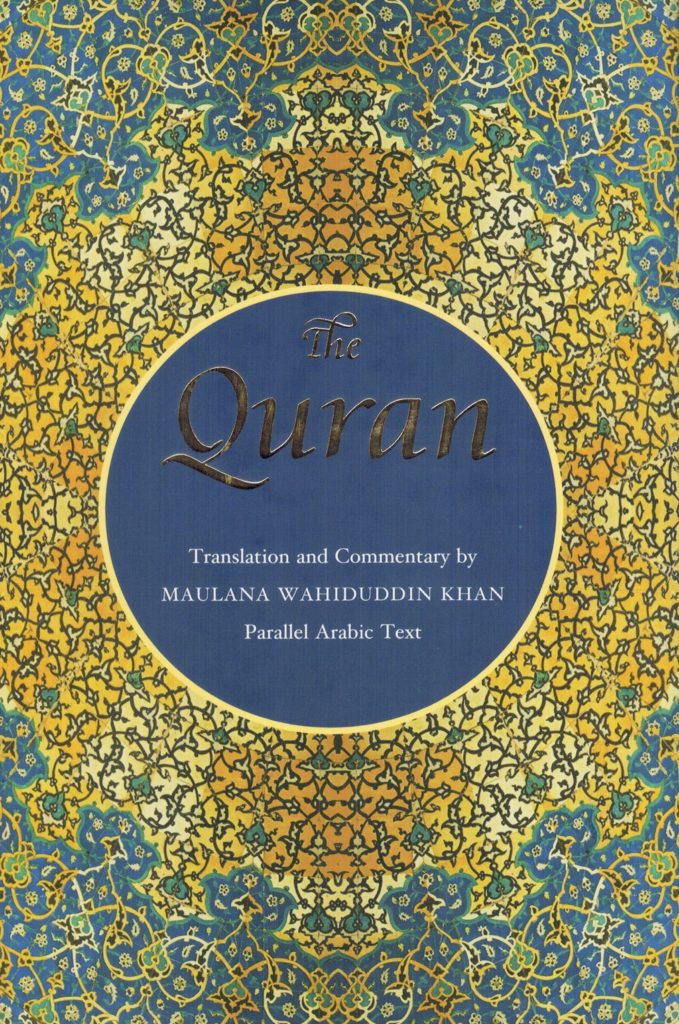by Afsan Yusuf Redwan, Islam UK Centre, Cardiff University
Can there ever be such a thing as a ‘spiritual translation’ of religious scripture? If so, then how would this be modelled to appeal to audiences? How would a ‘spiritual translation’ help proclaim the message of Islam, in essence, doing da’wah (‘proclaiming’)? Furthermore, is there a need for other translations that try to capture the multiple meanings of the original source text? The father-daughter approach taken by the late Indian scholar Maulana Wahiduddin Khan (1925–2021) and his daughter Professor Farida Khanam goes some way to answering these questions in their work ’The Qur’an: English Translation, Commentary and Parallel Arabic Text’ (2010; a monolingual English version without a commentary was published in 2009).
Interestingly this work includes an Arabic phrase under the title, which translates to ‘a translation of the meanings of the noble Qur’an in the English language’ (p.iv). The phrase ‘the meanings of the Qur’an’ very much points towards a wider theological stance adopted by translators which Khan explains saying that ‘translations cannot substitute the original’ (p.ix). It is reminiscent of a theological position which states that there can never be equivalence between Qur’anic Arabic and other languages. This position is taken by comparable translators such as Dr Muhsin Khan and Mufti Taqi Usmani who use ‘meanings of the noble Qur’an’ to avoid this theological criticism. The intention behind Khan and Khanam’s rendering may also be to avoid theological scrutiny as their front cover states ‘understanding the spiritual meaning of the Qur’an’, which is not a common approach to translating the Quran. This work originally appeared as an Urdu Qur’an commentary and translation in 1986, and it has since been translated into several languages. There are three unique facets to the English rendition: its introductory discussion of the major themes of the Qur’an, its inclusion of spiritual commentary, and the concordance included within the work.
First, the introduction emphasises Khan and Khanam’s theological outlook on Islam and key themes of the Qur’an. The inclusion of discussions on Qur’anic themes and essays is a growing trend in Qur’an translations. When woven together, the introductory essays offer the reader an insight into a modern ‘spiritual da’wah’ wherein reflection, contemplation and the provision of tools to aid thinking appeal to the reader. The successive themes of Khan and Khanam’s translation are: God’s plans for His creation, the Qur’an as a book of divine warning, inner spirit and realisation of God, the word of God, jihad as a peaceful ideological struggle, and the relevance of the revealed book to contemporary concerns. Their understanding of jihad, for example, which is presented as a primarily ideological struggle, is supported by reference to similar concepts from Christianity and Hinduism (p.xiv). This showcases how Khan and Khanam’s translation is produced with a contemporary audience in mind, and how it attempts to propagate a spiritual, theological approach to life. Their introductory section also illustrates how translations are essential vehicles for transferring contextual knowledge and how this can be an important wider function of Quran translations.
Following the introduction, the authors include a traditional timeline of events surrounding the revelation of the Qur’an and a map of the Arabian Peninsula at the time. Both components add to the introduction in that they provide further context that allows the reader to understand the world of the Qur’an.
Secondly, the commentary itself comprises the main expression of Khan and Khanam’s ‘spiritual da’wah’ model. Several examples can be seen in the commentary on the first surah, which they call ‘The Opening’. This commentary summarises three features of Sūrat al-Fātiḥa, as follows:
- Acknowledging God and why He is deserving of invocation (reflection)
- The physical existence of humanity as a gift from God (contemplation)
- The first surah is a portrayal of Islamic belief (thinking)
Within the commentary, a section reworks the translation to read as follows:
‘Lord, You are the Master of the Day of Judgement. I have submitted to You and humbly seek Your help; have mercy on me. Lord, show us the path that is, to You, the true path. Enable us to tread the path of Your chosen servants. Help us to avoid the path of those who have gone astray, and the path of those who have incurred Your wrath due to their obstinacy.’
This reworking elicits a ‘spiritual’ sense in that the phrasing refers to reflection, contemplation and thinking tools. The initial verses reflect on God’s nature as having authority over humanity. The next verses contemplate the true path which God can only give. Finally, the verse asking God to help us avoid going astray uses thinking tools.
Lastly, Khan and Khanam’s work includes a concordance at the end, which lists the words used in the Qur’an and the different chapters they occur in with a themed title. These can be useful to readers who want an accessible overview of the main words and terms found in the Qur’an. It again promotes a spiritual outlook. For example, the word ‘blind’ is listed in the concordance as referring to Q 17:72 ‘But whoever has been blind in this life will be blind in the life to come’. The imagery here does not represent literal blinding but refers to the blindness in recognising God and his gifts, a theme also emphasised in the opening commentary on Sūrat al-Fātiḥa. An emphasis on reflecting on the physical world is also found here with reference to the word ‘food’, which is found in Q. 80:24 ‘Let man reflect on the food he eats’.
This translation is a unique addition to English-language translations of the Qur’an that can be used to explore the function of spiritual themes and essays found in Qur’an translations. Maulana Wahiduddin Khan and Farida Khanam may be the first people to provide a fully rendered exclusive ‘spiritual da’wah’ English Qur’an translation.














